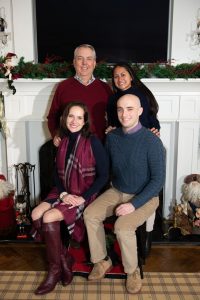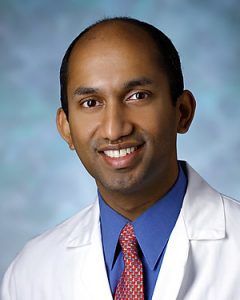Johns Hopkins UniversityEst. 1876
America’s First Research University
Carla Seebald only remembers bits and pieces of 2020 — salsa dancing in a parking lot, washing dishes on Christmas, and sitting frozen in a chair in overwhelming pain.
“It is like someone has put an electric current on your mouth, and you don’t know when it’s going to go off. It’s the most excruciating pain you can imagine. I know why they call it ‘the suicide disease,’” Carla says, adding the medication she was prescribed to manage the pain caused substantial memory loss.

Carla doesn’t remember meeting Chetan Bettegowda, Med ’05 (MD, PhD), the Jennison and Novak Families Professor in the Johns Hopkins Department of Neurosurgery and co-director of the Trigeminal Neuralgia Center. But her husband, Craig Seebald, vividly recalls waiting in the parking lot due to COVID-19 protocols as Bettegowda performed the surgery that would leave Carla pain free after living with trigeminal neuralgia (TN), a rare pain syndrome, for more than a year.
“It’s really impressive,” Craig says. “The technology and tools that they have are really good. Now, one of our goals is to help dentists and primary care physicians diagnose and refer people to Johns Hopkins.”
Craig and Carla’s son, Matthew Seebald, says it was amazing to see his mother return from Hopkins without pain after spending months accompanying her to appointments where some doctors dismissed her symptoms.
“There was a lot of minimizing,” Matthew, who is applying for medical school, remembers. “It taught me a lot of good lessons about how to care for someone with chronic pain. Dr. Bettegowda was amazing and treated her very respectfully. The weight that you give to what the patient is saying is important, and it’s something I aim to emulate as a future physician.”
In the year since Carla’s surgery, the family has made a commitment to support Bettegowda’s TN research. In addition to their gift, Matthew developed and hosted TN Tee Off, a fundraiser aimed at advancing Bettegowda’s work.
The funds are enabling Bettegowda and a team of researchers to investigate blood and cerebrospinal fluid in patients with TN for the presence of clinically useful, specific biomarkers. Scientists hope to translate these findings into a blood test that can aid in the correct diagnosis, treatment selection, and prognosis of trigeminal neuralgia.
Because TN is a rare disorder, Bettegowda says it’s difficult to obtain research funding through traditional mechanisms, such as the National Institutes of Health or other federal or foundational sources, which often focus on larger disease entities. Thanks to philanthropy, researchers are working to understand TN at a clinical level, exploring treatment options, and examining ways to improve care and surgical outcomes. They’re also partnering with scientists to better understand the mechanisms of pain.

“The Seebald family’s advocacy is incredibly important to enable folks like myself to make fundamental advances that can benefit future patients,” Bettegowda says. “They are really the model for how to make an impact on disorders that are poorly understood.”
Though not common in the overall population, Bettegowda says TN has been described as “the most severe form of pain that a human being can experience.” It affects one half of the face and is most commonly triggered by things that involve movement of the mouth — talking, chewing, eating, tooth brushing, wind, or cold. In some people, pain is caused by irritation of the trigeminal nerve, which controls sensation to the face, or by a blood vessel, tumor, or other abnormality.
“TN can be difficult to identify because it’s a clinical diagnosis, meaning there’s no x-ray, blood test, or MRI scan that says someone does or does not have it,” Bettegowda explains. “It’s really based on the constellation of symptoms that an individual presents with.”
Carla initially consulted with her dentist and primary care physician to help determine the cause of her pain. She had a root canal and a crown, but neither helped. A specialist prescribed a combination of pain medications, which was debilitating and contributed to memory loss and a change in her temperament. The medications also caused her to fall and shatter her wrist, which Carla says “made something horrible so much worse.”
“The specialist kept putting me on more and more drugs, and it’s maddening. I was on so much, I remember sitting in this chair, and I said, ‘I think I’m going to die.’ It is horrible,” she says. “Dr. Bettegowda literally saved my life, and I would not be here but for him and Hopkins.”
Though medication is a mainstay of TN treatment, Bettegowda says that in many cases, like Carla’s, it becomes ineffective at managing pain and can cause serious side effects. Surgical options include microvascular decompression, where doctors open the skull to separate a blood vessel from the nerve, and rhizotomy, a minimally invasive procedure targeting the trigeminal nerve.
“When you’re in pain and taking those kinds of drugs, it changes your personality. It’s hard on the person who’s suffering, the family, and everybody around them,” says Susanna Kondracki, a close family friend who recommended the Seebalds try Hopkins. “I’m just so incredibly grateful.”
Topics: Friends of Johns Hopkins Medicine, Johns Hopkins Medicine, Promote and Protect Health